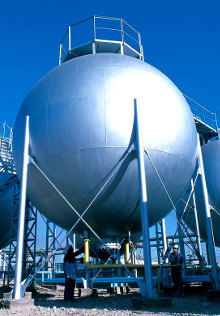Gas help dubbed "thought bubble"
 The Federal Government has knocked back growing calls for Australia to establish a domestic gas reservation.
The Federal Government has knocked back growing calls for Australia to establish a domestic gas reservation.
New South Wales Treasurer Matt Kean has urged the Albanese government to come up with a national gas and coal reservation policy to help combat skyrocketing energy prices on the east coast grid.
Reservation policies require gas companies to sell a portion of their gas into the domestic market - rather than put it all out for export - to drive prices downward.
In Western Australia, a reservation policy was first used by the former Charles Court Liberal government on Woodside’s North West Shelf gas project in the mid-1980s.
Alan Carpenter’s Labor government applied a 15 per cent reservation requirement on Woodside’s Pluto project in the mid-2000s, and despite much backlash from the industry, the requirement has been applied on every other major gas project since.
A 100 per cent domestic reservation policy is applied to all onshore gas projects in WA.
Mr Kean called on WA to scrap its state-based reservation policy (which holds onto 15 per cent of production from large-scale LNG projects for domestic customers) in favour of a national scheme.
“Just like WA wants NSW taxpayers to prop them up by taking our GST, NSW families expect WA to do their bit to support them during this energy crisis,” Mr Kean said.
Bruce Robertson - a gas analyst at the Institute for Energy Economics and Financial Analysis - says a national reservation policy would “cut electricity prices, and still make money for gas companies”.
Mr Robertson says the policy would have “an immediate downward effect on prices”.
“In Australia, gas prices are fixed by a cartel of producers on the east coast of Australia – Shell, Origin, Santos, Woodside and Exxon. For decades they have set the price above international parity prices,” he wrote in an article for RenewEconomy.
“As the world’s largest LNG exporter, Australia is swimming in gas supply. Yet, the east coast may end up using expensive imports to supply the majority of its gas.”
Former senator Rex Patrick has also pointed to the success of the WA reservation policy, saying; “Prices are lower, supply guaranteed”.
“Next year Australia will produce about 1980 petajoules of gas, of which only 570 petajoules will be used domestically. We have plenty of gas,” Mr Patrick says in an article for Michael West Media.
“The high cost of gas is the result of government policy failure and the unrestrained greed of the gas cartels, not any lack of supply.
“The simple solution to the gas crisis and rising energy bills is being ignored… Domestic Reservation Policy works.”
Australia’s main fossil fuel lobby, the Australian Petroleum Production & Exploration Association (APPEA), says that “the introduction of a DGR [Domestic Gas Reservation] on the east coast of Australia would come at a significant cost to the nation’s economic welfare… [of] $6 billion in forgone GDP at 2025.”
“Every one per cent of future gas exports which is artificially re-directed towards the
the domestic market reduces GDP by an estimated $150 million at 2025.
“Deferring resources from their highest and best use in the absence of market failure is seldom - if ever - welfare enhancing.”
Federal Infrastructure Minister Catherine King has moved to douse the growing calls for a reservation policy, describing Mr Kean’s comments as “a few thought bubbles”.







 Print
Print